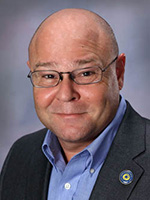Please allow us to take a moment to brag a little and share a lot of credit. Volume 10, Issue 1 marks our 10-year anniversary of publishing the eJournal of Public Affairs, or eJOPA. The journal evolved from a print publication put out by Missouri State University between 1997 and 2006. Thanks to the efforts of Dr. Rachelle Darabi, in collaboration with the American Democracy Project, eJOPA restarted as an online publication in 2012. Adhering to its commitment to excellence and innovation, eJOPA has met its ambitious goal of publishing three issues a year—with just two exceptions: once in 2016, when our managing editor died tragically, and the other in 2020, due to the COVID-19 crisis we are all still facing.
EJOPA is an academic resource that reflects our good fortune of talent, expertise, and commitment by authors, reviewers, guest editors, editorial board members, and colleagues. We have benefited from the authors bringing their original work to the journal, the reviewers who provide their expertise through the double-blind peer-review process, the editors for their dedication and their impressive skills, and the editorial board members who keep us focused and engaged. We pay tribute to the guest editors over the years who have brought special topics to our attention, and our deep appreciation goes to everyone who has been a part of eJOPA’s mission. Faculty, students, community members, administrators, philanthropists, artists, and entrepreneurs are among the many others doing the important work we frame in every issue.
The eJournal of Public Affairs is informative, inclusive, and impactful. As a scholarly journal with a civic engagement mission, eJOPA also creates opportunities for students and community members. Personally, it has been an honor and privilege to meet, work with, and get to know such engaged, caring, and informed people. We are blessed because our work involves collaboration with remarkable individuals doing incredible things. Being surrounded by talent tends to produce effective and inspiring results, and we believe this is the essence of the eJOPA experience.
During the past decade of publishing eJOPA, we have innovated our format when the scholarship has allowed us to try something different. This current issue is another example of playing to the strength of the submission. “Cowboys Coming Together: Campus-Based Dialogues on Race and Racial Equity” is the only scholarship in this issue, produced in co-authorship by Tami L. Moore, Michael D. Stout, Patrick D. Gallaway, Autumn Brown, Nadia Hall, C. Daniel Clark, and Jonathan Marpaung. Although we generally publish multiple smaller articles, the Oklahoma State University project discussed in Moore et al.’s article provided a case study that brings out the depth and purpose of an important and successful campus initiative. Because this campus-conversation initiative used a tool developed by Everyday Democracy to make the hard work of hearing each other across divided perspectives more guided and productive, we have included a response to Moore et al.’s article, written by the designers of the tool deployed in the work—a first in the journal’s history. Everyday Democracy executive director Martha McCoy presents that response, providing insight into the commitment of the organization to the challenging work of purposeful exchange around public problems such as race and equity. Additionally, Elizabeth Gish of the Charles F. Kettering Foundation has provided a response to Moore et al.’s article which not only offers feedback to the scholarship, but also points to where similar research might continue.
Every issue of the eJournal of Public Affairs has included book reviews that provide insight and/or inspiration aligned with purpose in public life. In this issue, we are pleased once again to fulfill that aim. Nora A. Cox reviews two recent books on the importance of productive dialogue and exchange, a capacity for meaningful communication that is more crucial than ever to the success of public life. We Need to Talk: How to Have Conversations That Matter, by Celeste Headlee, and Reclaiming Conversation: The Power of Talk in a Digital Age, by Sherry Turkle, reconnect us to the centrality of overcoming divisions of dispute and technology so that we can begin to hear each other again in our full humanity. Cox combines her perspective on the two books into one essay that complements this issue’s theme of dialogue.
“Tell Your Story” is our feature section for presenting narrative vignettes that generally do not come with the data or theories expected in academic scholarship. Yet, these are stories of businesses, agencies, individuals, and work that make a difference to the possibilities of public life. Raise Your Hand Texas is a nonprofit organization that advocates in a variety of ways for public education in the state. Whether by recommending ideas to help legislators create sound educational policy, or through its programmatic support for educators, or by offering scholarships to students who dream of a career in the classroom, Raise Your Hand Texas works to make the success story of public education in Texas a reality that continues into the future. We hope you will take the time to watch and share the two video stories of Raquel, a young woman who used support from the Charles Butt Scholarship for Aspiring Teachers to earn her college degree while also holding fast to the commitment of a family whose hard work and love were a driving motivator for achieving her dreams. We are grateful to Raise Your Hand Texas and digital producer Anne Bannister for bringing Raquel’s inspiring story to you in this issue.
The year 2020 dramatically—and tragically—reminded us that we do not know what the future holds. Whatever the future brings, however, we at the eJournal of Public Affairs are dedicated to continue bringing you scholarship and stories about civic life and the work that supports it.
Authors

Andrew P. Lokie, Associate Professor in Library Science at Missouri State University, came to MSU to expand the instructional technology resources across the university. He served in similar capacities including Multimedia Producer at Ohio University, Director of Instructional Media Services at Bucknell University, and Director of the LRC- (Library and Media Services) at Broome Community College. As editor of the eJournal of Public Affairs and Director of Special Projects, has succeeded in its tenth year of publishing a scholarly journal and producing media and multimedia materials.
 Darrell A. Hamlin is Associate Professor of Political Science at Fort Hays State University, a Senior Fellow at the Center for Civic Leadership at FHSU, and Managing Editor for the eJournal of Public Affairs. He previously served as Associate Professor of Criminal Justice at FHSU and as Assistant Professor of Political Science and Law at Spring Hill College. He holds a B.A. in American Studies from Baylor University and an M.A. and PhD in Political Science from Rutgers University.
Darrell A. Hamlin is Associate Professor of Political Science at Fort Hays State University, a Senior Fellow at the Center for Civic Leadership at FHSU, and Managing Editor for the eJournal of Public Affairs. He previously served as Associate Professor of Criminal Justice at FHSU and as Assistant Professor of Political Science and Law at Spring Hill College. He holds a B.A. in American Studies from Baylor University and an M.A. and PhD in Political Science from Rutgers University.